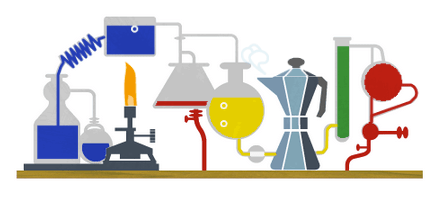The sad truth is that, if everyone on the Forbes 400 list simultaneously (and tragically) got cancer, or Parkinsons (or any given disease for that matter), the world would probably be well on its way to finding a cure for these illnesses, thanks to the enormous wealth that would be incentivized to back those efforts.
Finding a cure for an intractable disease requires time, enormous amounts of human and financial capital, cooperation and research — and at least a few public-private partnerships. It’s costly, and it’s messy. This is why Calico, Google’s newest mad science project, is potentially so exciting.
In fact, Calico could represent the company’s largest health-care initiative since Google Health sprinted its way into obscurity. Of course, Google is a different company today than it was in 2008 (when it launched Google Health) and so are we. Our habits have changed: Today, 20 percent of smartphone users have downloaded at least one health app, and 60 percent of adults now look for health information online.
Led by former Genentech CEO and current Apple Chairman, Arthur D. Levinson, Calico has big plans in health care — at least over the long term. From what we’ve heard thus far, the new project will leverage Google’s massive cloud and data centers to help facilitate research on disease and aging by mining its trove of data for insight into their origins.

Plus, thanks to its investment in 23andMe, Google already has access to a fast-growing genomic database, which could come in handy as it begins to focus on, in its words, “health and well-being — in particular the challenge of aging” and dive into the science, genetics and biochemistry behind longevity and disease.
In an interview with TIME Magazine, Google CEO Larry Page implied that dramatically extending human life is one of Calico’s main goals; not making people immortal per se, but, according to a source familiar with the project, increasing the lifespan of people born 20 years ago by as much as 100 years.
“Are people really focused on the right things?” Page muses in the interview. “One of the things I thought was amazing is that if you solve cancer, you’d add about three years to people’s average life expectancy. We think of solving cancer as this huge thing that’ll totally change the world, but when you really take a step back and look at it, yeah, there are many, many tragic cases of cancer, and it’s very, very sad, but in the aggregate, it’s not as big an advance as you might think.”
While his delivery is a bit confusing, Page’s thesis seems to be an optimistic one: While curing cancer has always seemed like an insurmountable obstacle, the goal is more within reach than many believe — if only someone would just put their mind to it, he seems to say. Yes, Larry Page is brilliant, but his message also seems to imply that diseases (and their cures) are reducible — that all of the world’s problems could be cured if we just had some snappier algorithms.
Really, it almost seems more of a reflection of how the enormous many-headed-beast that is Google has become, as well as a testament to its resources and the type of talent it’s able to attract — rather than pure, unbridled hubris. It’s as if they’re saying: “Hi, welcome to Google! Today, we’re going to turn your eyeglasses into a computer, tomorrow we’ll develop self-driving cars, the day after that, we’ll cure cancer and increase the average human lifespan by 100 years. Oh, and by the way, we’re still trying to organize all of the world’s information and make it easily searchable!!” N.B.D., everybody, N.B.D.
Interestingly, Calico doesn’t seem to be a Google company per se, more of an investment in a new company that will be affiliated with Google and become an extension of the company’s mad science lab, Google X. “Don’t be surprised if we invest in projects that seem strange or speculative compared with our existing Internet businesses,” Page warned readers on Google+, Google’s social network. [Yes, let’s not forget that Google also has a social network. It’s like Facebook except no one uses it!] “Please remember that new investments like this are very small by comparison to our core business.” Of course, with a market cap approaching $300 billion, Google could make a $1 billion investment in Calico and it would still be a very small investment “by comparison to its core business.”
Not satisfied with self-driving cars and Google Glass, Page says health is something the company needs to tackle, that he wants to “solve cancer” the same way Google X has tried to experiment and innovate in wearable computing and transportation. “It takes 10 or 20 years to go from an idea to something being real. Health care is certainly one of those areas,” he told TIME’s Harry McKracken. “We should shoot for the things that are really, really important, so 10 or 20 years from now we have those things done.”
Sources tell us that Calico is still very much in the exploratory phases and is seeking neither near-term profits nor has much of any idea about how to actually increase lifespans. So there’s that. It’s one thing to say “we’re going to increase the human lifespan by 20 years!” and another entirely to actually do that. Fortunately, Page and Levinson aren’t the first ones to attempt longevity: Immortality has long been the ambition of kings, super villains and pretty much anyone who enjoys waking up each morning.
While Google Calico is still a work in progress, given what we’ve learned so far and heard from our sources, here are a couple of ways the company could push us towards that goal — or at the very least, extend our lifespans.
Immortal Worms, Telomeres & Cellular Clean Up
It may surprise you, but in the race to immortality, humans are in second place. But who is this agile and fleet-footed creature out-distancing we ever-powerful humans, you ask? Why that would be none other than the noble Planarian worm. Yes, in 2012, scientists from the University of Nottingham found a species of Planarian worm that could perpetually heal itself and divide.
“Usually when stem cells divide — to heal wounds, or during reproduction or for growth — they start to show signs of aging. This means that the stem cells are no longer able to divide and so become less able to replace exhausted specialized cells in the tissues of our bodies,” explained researcher Aziz Aboobaker. “Our aging skin is perhaps the most visible example of this effect. Planarian worms and their stem cells are somehow able to avoid the aging process and to keep their cells dividing.”

Essentially, one of the keys to immortality lies in telomeres — which are essentially a region of nucleotide sequences that act as a protective cap, deterring the degradation of genes near the end of chromosomes by allowing their ends to shorten. Huh? In other words, as Science Daily points out, the telomere is like the protective plastic cap at the end of your shoelace; each time a cell divides, the telomere protects it from fraying or going on a five-day bender. However, each time it does divide, your telomere caps are reduced.
Theoretically, then, if someone can figure out a way to preserve or elongate these telomeres, then we would be one step closer to a veritable genetic fountain of youth. Unfortunately, the science is still scant. Back in 1996, a team of Nobel Prize-winning scientists explained that “telomere length is clearly not directly correlated with organismal aging” [PDF].
However, Elizabeth Blackburn, Carol Greider and Jack Szostak won the Nobel Price for Physiology and Medicine in 2009 for their work, which found that telomere length could potentially be maintained by catalyzing the activity of an enzyme known as “telomerase.” However, as Science Daily points out, in most organisms, the enzyme is really only turned on during those early developmental years. Planarian worms have managed to outfox this, and by studying the mechanics of their division and how they protect against degradation, Google Calico and anyone else for that matter could be on the right track.

Of course, again, real progress in longevity research requires time and money. Organizations and companies have been trying to tackle this problem for years, and many have been rebuffed. For example, in 2008, pharma giant GlaxoSmithKline shelled out $720 million for a promising drug, SRT501, a modified version of a substance found in red wine that has been linked to anti-aging. Two years later, Glaxo gave up.
But that was five years ago, and this is the company that managed to map the entire planet in a few years. It’s hard to imagine Google will be pumping much money into Calico at first, but if it does, it could make a real difference. For now, sources tell us that Calico will primarily function as an R&D group, exploring the latest in longevity science. However, it won’t rule out the possibility of manufacturing its own products down the line.
At some level, Larry Page, the company — someone in Mountain View — has become convinced that Google needs to help figure out the aging problem. As Bette Davis and most 90-year-olds will tell you, “old age is no place for sissies.” It’s tough. After all, longevity isn’t any fun if one spends the last decade of life wheezing in a hospital bed.
Then again, it’s how life works. As the truisms say, aging is one of the few things in life you can count on.
Hardware: Replacement Organs & Nano Repair Bots
Many people die because one of the vital organs in their bodies stopped working. In recent decades, we’ve dramatically lengthened some lives by simply replacing the faulty part: A heart, kidney, lung, etc.
In the near future, we’ll be able to replace organs at scale with the magic of 3D printing. Scientists have already discovered how to transplant a manufactured kidney, so at some point in the future, heart failure may be just as inconvenient as having to take another trip to Kinkos.

With a colonoscopy costing $7K in New York today, and the average price of a hip replacement in the U.S. being $40K, printing up a new heart would be a welcome change for our wallets. Though until the cost of 3D printing at scale is realized (it’s going to take a while), these kinds of procedures will likely remain on the more expensive side.
And the harsh truth is that fixing organs may not be enough to stave off the effects of old age in the first place. Repairing whole swaths of decrepit tissue and dying cells is likely where science will turn next. Interestingly enough, Google’s Director of Engineering, Ray Kurzweil, believes that an army of nanorobots will eventually do all of our internal tune-ups. The nanobots themselves could mimic the very structure of DNA that is the foundation of our cellular makeup. While the thought is exciting, today this remains in the theoretical realm, i.e. science fiction.
Despite Kurzweil being an authority on immortality, two sources close to the project say that he won’t be working for Calico; instead, he’ll continue focusing on building out his “cybernetic friend” project at Google HQ. That being said, it’s hard to imagine Kurzweil being able to stay away from the project for long, considering how much energy he’s dedicated to thinking about the problem.
Cancer
While Page says that curing cancer won’t be the key to extending the average human lifespan, at some point, Calico and others will have to face it head on. “If a human could live long enough, it is inevitable that at least one of his or her cells would eventually accumulate a set of mutations sufficient for cancer to develop,” explains a team of authors in Molecular Biology of the Cell.
Thus, cancer is an inevitable part of the decay of our cells and, unfortunately, an omnipresent risk as we continue to live longer and longer. One source close to the project says that Google is exploring solutions in the area of genetically personalized medicine. Tailoring drug treatment to the unique biomarkers of the individual, such as the field of Proteomics, is a new path for improving cancer treatment.
BUT WHAT DOES IT ALL MEAN?!?!
There’s a lot of exciting work going on at the intersection of health care and technology. The advancements in computing, mobile technology and data analysis have allowed startups like Neurotrack to help push research on diseases like Alzheimer’s forward, and even predict its onset years before it happens. Companies like Proteus Digital Health are leading the charge into personalized medicine with a pill that can text doctors and family members from inside your body, to paraphrase The Telegraph’s paraphrase.
Startups can change the conversation around innovation in digital health by experimenting, pushing the envelope and staying nimble. However, just having the name of a tech industry giant like Google enter the fray on the digital health front is huge, especially when its chief executives are resolved to help tackle these enormous problems — from diseases like cancer to those pesky age-related wrinkles.
It’s still a bit too early to say how much Google plans to — or will — move the needle in the race for immortality and beautiful skin, but it’s an important step. Throwing its name in the ring will incentivize others to do the same.
Why? As Dr. Katherine Pollard of San Francisco’s Gladstone Institutes explained at TechCrunch Disrupt SF last week, there is still a significant gap between researchers and entrepreneurs — scientists and Silicon Valley. However, at the same time, there are now more opportunities than ever before for both sides to team up to make technological breakthroughs in health care, and, in turn, making those breakthroughs more accessible to the public.
This is important because it’s easy to get wrapped up in the exciting science and technology underlying these problems — and trying to solve the unsolvable — but extending longevity just for the sake of longevity’s sake (while arguably a core element of our survival instinct) is silly. There are 7 billion people on this planet, and if Google and others are going to enable the majority of them to add 10 years to their lives, it will likely create even bigger problems — chiefly in the “resources” department.
Today, more than 1 billion people live without access to the most basic forms of health care. Not to criticize a beautiful thing before it even sets sail — only a cruel, heartless jerk would find fault with a project that deals, in part, with curing cancer, mind you — but this is worth pointing out. There may even be more urgent or salient problems in health care (at large) that a company like Google could help solve; one could argue that bringing basic health care to a billion people needs to come before we worry about extending one person’s life from 95 to 100.































Comment